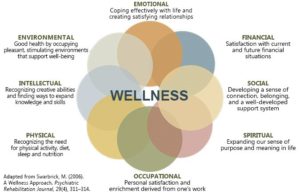In higher ed today, student success is focused on retention, graduation, or completion rates. Institutions appear to be stuck in the paradigm that if college students simply complete their degrees, they will be successful. Unfortunately, students are not really being taught how to define success for themselves, beyond institutional goals.
Whether measuring on a professional or personal basis, people are seeking a new set of success metrics. Some see success as aligning passions with career paths, but a LinkedIn survey found that only 30 percent of respondents find their dream job.
We offer another perspective: Student success is mental health and holistic well-being.
A different way of defining student success
The nation’s mental health and well-being are under duress. According to the National Alliance on Mental Illness [1] report on mental health and well-being:
- Approximately 1 in 5 adults in the U.S.—43.8 million people—experiences mental illness in a given year.
- 18.1% of adults in the U.S. experienced an anxiety disorder such as post-traumatic stress disorder, obsessive-compulsive disorder, and specific phobias.
- Among the 20.2 million adults in the U.S. who experienced a substance use disorder, 50.5%—10.2 million adults—had a co-occurring mental illness.
- Young adults aged 18-25 years have the highest prevalence of mental illness (22.1%) compared to adults aged 26-49 years (21.1%) and adults 50 years or older (14.5%).
To contribute to a healthier and happier society, university leaders need to relay to students the interconnectedness between mental health and well-being and student success. We need to redefine “student success” from being completion metrics to producing holistic well-being outcomes.
Holistic student success
A holistic framework for student success includes these eight dimensions of well-being:
- Emotional – coping effectively with life and creating satisfying relationships. (Emotional well-being reduces incidences of sexual assault on campus, anxiety, binge drinking, et al.)
- Spiritual – expanding our sense of purpose and meaning of life [2]: for examples of life purpose curricula such as programs at Harvard and the University of Minnesota.)
- Intellectual – recognizing creative abilities and finding ways to expand knowledge and skills.
- Physical – recognizing the need for physical activity, a healthy diet, and sleep.
Occupational – personal satisfaction and enrichment derived from one’s work. (This is a focus of a seminar at Stanford University.) - Financial – satisfaction with current and future financial situations.
- Social – developing a sense of connection, belonging and a well-developed support system.
- Environmental – good health by occupying pleasant, stimulating environments that support well-being.
(Adapted from A Wellness Approach [4], Swarbrick, M., 2006.)
Teaching students to define their own success
A transformative model with high-impact practices is available to help impart holistic student success. Research-based best practices provide guidance for professionals working in critical student success functional areas—academic advising, career services, counseling and psychological services, faculty teaching, and student engagement.
The Integrated Success [5] (iSuccess) model helps colleges and universities develop psychologically healthy and self-aware students as a part of their educational mission. The model—which empowers students to create their own pathways to success in college and in life—includes:
- Integrated Self Model (iSelf) – a framework to help students understand their holistic selves through self-system and positive psychology attributes.
- Self Across the Curriculum (SAC) – a pedagogy to teach students self-knowledge through curricula.
- Success Predictor (SP) – a student success assessment instrument and intervention tool to help students define their own paths to success.
When the self becomes the lens through which students learn, students can balance cognitive with non-cognitive factors to become happy and whole people who are equipped to create a positive life and make contributions toward a better society.
Related: Student wellbeing is more important than you think [6]
A lack of self-knowledge is a risk factor that can lead to harmful behaviors, lack of motivation, detachment from academic studies, and decreased resilience required to overcome obstacles. Dropout rates from colleges point to students’ lack of self-understanding and purposeful direction. Therefore, retention itself should not be our focus, but rather student well-being, student satisfaction, and student-directed success pathways.
Think about it: Can we say a student is succeeding if he or she is not well or not effectively handling health issues? Can students say that they are succeeding if they are filled with anxiety and having difficulty functioning? Student success is simply not possible without well-being.
To implement a comprehensive model of student success and best practices that empower students to take charge of their own definition of success, we need to give students the tools to chart their own pathways, as well as to more pro-actively use the extensive resources that can be made available to them at colleges and universities. If and when we do this, student affairs and academic affairs will be more effective in empowering their students’ success.
